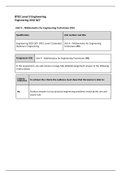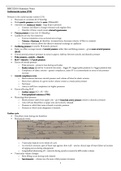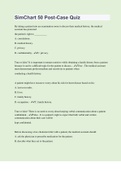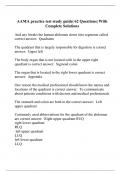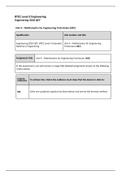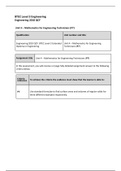*On considering ‘best bid’, consider factors other than price e.g. collection of goods
Offer or ITT?
Generally, requests for tenders are merely invitations to treats, where any bids constitute
offers: Spencer v Harding. The inviter is contractually bound to accept the highest bidder
when the request for tenders expressly states so: Harvela Investments v Royal Trust Co of
Canada. In this case, the inviter has made a unilateral offer to accept the best bid.
Referential bids are not valid offers in the tender process: Harvela Investments v Royal Trust
Co of Canada.
However, where there is a clear intention to create legal relations, a request for tenders may
amount to an offer: Blackpool Aero v Blackpool BC. Per Bingham LJ, this intention may be
inferred by “express words” of the tender or from the “circumstances surrounding the
sending out of the invitation to tender”. The inviter is contractually bound to consider tenders,
but need not accept any of them: Blackpool Aero v Blackpool BC. In Gibson v Manchester
City Council, there was no intention on the Council’s part to be legally bound (since they
merely indicated a price that they may be willing to sell the house to Gibson), therefore they
were held to be extending an invitation to treat. On the other hand, in Storer v Manchester
City Council, where the council clerk wrote that he was enclosing an agreement of sale, it
was held that the Council had an intention to be legally bound and was extending an offer.
Auctions with reserve are invitations to treat, where the bid (the offer) is accepted on the fall
of the hammer: British Car Auctions v Wright. In auctions without reserve, the auction house
makes an offer, of which acceptance occurs when the highest bid is made: Barry v Davies.
Conventionally, displays in stores are invitations to treat: Fisher v Bell. Advertisements are
typically invitations to treat: Partridge v Crittenden. Advertisements on websites are likely to
be invitations to treat: Chwee Kin Keong v Digilandmall.com (persuasive SG authority).
Publishing a train timetable is an offer, which the customer accepts upon purchasing a ticket:
Denton v Great Northern Railway Co. Running a bus is an offer, which the customer accepts
upon boarding: Wilkie v London Passenger Transport Board. Signs about parking prices in a
,carpark are offers, which the customer accepts upon entering the carpark: Thornton v Shoe
Lane Parking.
Valid Offer?
Merely supplying information with no intention to be legally bound does not amount to an
offer: Harvey v Facey.
In “battle of the forms” cases, the terms of the contract belong to the party who last tried to
impose their terms on the other party without objection: Brogden v Metropolitan Railway Co.
This approach should be adopted unless the documents and the parties’ conduct evince a
common intention for some other terms to prevail: Tekdata Interconnections v Amphenol.
Terms are construed objectively per how a reasonable person in the parties’ positions would
understand them: Smith v Hughes. This depends not on the parties’ subjective intentions,
but what was communicated between them by words or conduct: RTS Flexible Systems v
Molkerei.
Nonetheless, the contract is invalid if either party knew that a mistake had occurred: Smith v
Hughes. Where the offeree cannot reasonably have supposed that the offer contained the
offeror’s true intentions, there can be no valid acceptance: Hartog v Colin & Shields. The
offeror has no duty to signal a mistake to the offeree nor seek clarification: Sherrington v
Berwin Leighton Paisner.
Mirror Image Rule
Generally, acceptance must mirror the original offer: Hyde v Wrench.
A counter-offer with a different price/different condition (e.g. subject to inspection) terminates
the original offer such that the latter can no longer be accepted: Hyde v Wrench. Requests
for information, however, do not terminate the original offer: Stevenson, Jacques & Co v
McLean.
Cross-offers, even if exactly the same, do not constitute acceptance of either offer: Tinn v
Hoffmann. Performance in ignorance of the offer does not constitute acceptance of the offer:
Clarke (Australian case, but surprising if different position adopted in English law). Since
,[parties] were ignorant of each other’s offers at the same time, they are unable to accept
each other’s offers, hence no contract is concluded.
Valid Acceptance?
Communication of Acceptance
If the method of acceptance is not prescribed, an objective manifestation of an intent to
accept amounts to acceptance, such as a signature in Brogden v Metropolitan Railway Co.
However, if the method of acceptance is prescribed as the sole method of acceptance, the
offeree must follow the offeror’s terms of acceptance to have a valid contract: Eliason v
Henshaw. If a method of acceptance is prescribed, but not in terms stating that only the
specified method of acceptance is binding, another method of acceptance that is ‘no less
advantageous’ to the offeror is valid: Manchester Diocesan Council v Commercial and
General Investments.
Generally, acceptance must be communicated by the offeree to the offeror, so acceptance
by silence is invalid: Felthouse v Bindley. Nonetheless, in unilateral contracts, the offeror
may waive the requirement of communication: Carlill v Carbolic Smoke Ball Co.
Postal Rule
*Postal rule should be mentioned in all cases of acceptance
Non-Instantaneous Communication: Postal Rule
The postal rule dictates that acceptance by post takes place when acceptance is posted:
Adams v Lindsell. It does not matter if the acceptance never reaches the offeror: Household
Fire Insurance v Grant. It must be reasonable for the person sending acceptance to do so by
post: Henthorn v Fraser.
The postal rule does not apply where the offeror requires ‘notice in writing’, which means
that acceptance takes place when it is received by the offeror: Holwell Securities v Hughes.
, The postal rule does not apply due to incorrect posting as a letter of acceptance must be
placed in a Royal Mail post box or handed to a post office employee authorised to receive
mail: Re London & Northern Bank, ex p Jones. Since acceptances posted by courier are not
placed in a Royal Mail post box nor handed to a post office employee, it is submitted that the
postal rule should not apply to couriers.
Instantaneous Communication (by Telex)
The postal rule does not apply to instantaneous communication: Entores v Miles Far East
Corp.
If it was the offeror’s fault that acceptance was not received, the offeror is still bound:
Entores v Miles Far East Corp. There is no contract if the offeror, without any fault on his
part, does not receive the message, but the offeree reasonably believes that it has: Entores
v Miles Far East Corp. The contract is made when and where acceptance is received:
Brinkibon v Stahag-Stahl.
Where revocation is received outside business hours, it will not take effect until the
resumption of normal business hours; where revocation is received during business hours,
revocation takes effect once the telex is received: The Brimnes. Applying this to the present
case, assuming [x business]’s business hours are conventional (9am-5pm), the acceptance
was [valid/invalid] and there [is/is not] a binding contract. The Brimnes may be distinguished
from the present case as the former is about revocation while the latter is about acceptance.
Nonetheless, it is likely that the precedent of The Brimnes can be followed, since both are
effective upon receipt.
Instantaneous Communication (by email)
No clear, unequivocal UK authority for whether the postal rule should apply to email.
The postal rule should apply to email acceptances such that they are effective upon sending:
Chwee Kin Keong v Digilandmall.com (persuasive SG authority).
Acceptance by email should be received by the offeror to be effective: Greenenergy SA v
Memphis Biofuels.

